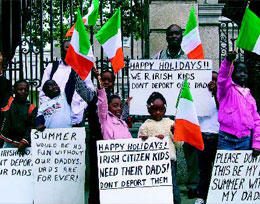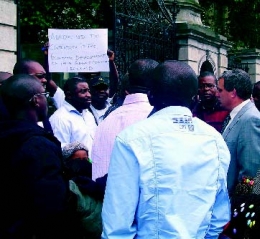HUNDREDS of fathers could be torn away from their Irish children.
Some of the men – mostly Nigerians whose wives and Irish children are legally resident here – rallied outside the Dáil last week to pressurise the Government into resolving the situation.
The fathers came to Ireland after their wives had given birth here (when residency was linked to having Irish-born children) and did not benefit from their wives’ original residency applications. They are barred from working, and some – like Ismail Ogunmade from Co Waterford – have been issued deportation orders.
Ogunmade is father to seven-year-old Irish citizen Zainab, who is old enough to know something of her dad’s predicament.
“She wanted to come here today with me but I think it would stressful for her,” he told Metro Éireann. “When I said I’m coming, she asked if I’m going to meet my lawyer, she knows everything that’s happening.
“It’s not easy for a man and father to stay at home for over two years now,” he continued. “It’s crazy, I don’t know sometimes whether I’m losing my mind.”
Ogunmade, a computer science graduate, has two other children, and says he doesn’t want to evade his family obligations. “A father is very important in the life of a child, I’m not trying to run from my responsibility. If I go back I’d feel guilty that I’m running from my responsibility.”
Under threat of deportation, the Nigerian man must sign on at the Garda National Immi-gration Bureau in Dublin within a fortnight. Ogunmade said he wants to set up a travel business if permitted to stay.
“It is something that is de-pressing, most especially when you know you have a lot that you could contribute to the uplifting of the economic community,” said Abdullaih Akeem Ahmed, an agricultural engineer by trade who is also affected. The Nigerian said he feels “handicapped” as a husband and father.
The wife of Okiki Ogundare, another protester, got residency in Ireland upon the birth of their six-year-old son Toby. But the Co Westmeath-based Nig-erian, in Ireland for two years, has also not received his residency status.
“I’m an engineer, I want to work if there’s an opportunity to work,” he said. “The main reason we want to stay is for a good education for the children. We have two little boys.”
His wife, an accountant, is studying. “And I do the child minding,” said Ogundare, who is an electrical engineer.
“It’s traumatic, you can’t work, you can’t go on holidays with your children,” said Ederaro Friday, in Ireland since October 2006. His wife got residency after the birth of their son Collins Omoefe in May 2003.
“My wife has been working but recently was made redundant,” said Friday, a trained accountant. “My older son doesn’t really know [what’s going on], he just knows that daddy is at home.”
Friday said the issue is particularly confusing as some fathers in his situation have been accorded residency, while others haven’t.
“We don’t know the criteria the department [of Justice] uses in giving the papers. Some are given, some are not given.”
A Department of Justice spokesperson told Metro Éireann that the Irish Born Child (IBC) scheme was briefly reopened in 2005, with over 16,000 people granted temporary two-year residency. Applicants needed to be in the country when they made their applications, and most were subsequently given an extension of three years.
“The IBC ‘05 scheme is now closed,” explained the spokes-person. “Therefore, applications for leave to remain in the State from these fathers are being processed on an individual basis.”
The spokesperson said that decisions will be made in accordance with last year’s Supreme Court judgment in the Oguekwe case, which found that the Minister for Justice had failed to give “substantial” reasons for the deportation of Irish child Chuka Paul Oguekwe’s parents.
When determining whether to make a deportation order, the minister looks at 11 separate criteria, including the age of the person, length of time in the State and their family and domestic circumstances, added the spokesperson.
deputyeditor@metroeireann.com













